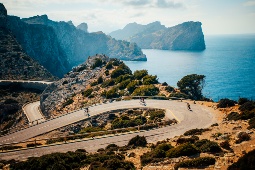The country is committed to a greener future, with innovation and investment in mobility and energy efficiency.
Spain strengthens its leadership in tourism sustainability: figures that confirm it
Spain is at the forefront of sustainable tourism, consolidating its position as one of the world's most committed destinations in terms of sustainability. With innovative initiatives and an investment of 3.4 billion euros from the EU Recovery Plan, the country not only protects its natural and cultural heritage, but also boosts the economic and social growth of its destinations. This effort has led Spain to be recognized by Lonely Planet as the best sustainable destination in 2024, reaffirming its international leadership in the sector. Tourism sustainability has become a strategic pillar for Spain, promoting projects ranging from the protection of natural spaces to sustainable mobility and energy efficiency. For this reason, the country will allocate 1,858 million euros to finance actions at the local and regional level through the Tourism Sustainability in Destinations, as stated in Turespaña's sustainability communication argumentation. Spain has more than 36% of its territory protected and 12.3% of its waters, leading the contribution to the Natura 2000 Network in Europe. The country currently has 16 declared national parks, 153 natural parks, 291 nature reserves, 363 natural monuments, 63 protected landscapes and 2 protected marine areas, and more than 900 areas with other figures developed by the autonomous communities. At the same time, the country has the largest number of Biosphere Reserves recognized by UNESCO, with a total of 55. These achievements reflect the sector's commitment to preserving natural resources while promoting environmentally friendly tourism.

In terms of mobility, Spain has the most extensive high-speed train network in Europe (3,152 km) and the second in the world after China, facilitating efficient and sustainable travel. In addition to this, there are local initiatives to promote non-polluting urban transport and the development of cycling infrastructure in cities such as Barcelona, Valencia and Madrid. The hotel sector also stands out for its involvement in the transition to a more sustainable model. Major chains such as Iberostar, Barceló and Meliá have adopted ambitious plans to reduce emissions and energy efficiency, setting a benchmark in the industry. In addition, the country promotes programs that directly benefit local communities: 500 million euros for the rehabilitation of historical heritage for tourism use, 200 million euros focused on energy efficiency and circular economy projects for companies in the sector and 20 million euros for the Tourism Experiences Spain program with sustainable, digital, inclusive and competitive tourism projects. The action plan also covers the social dimension of tourism, promoting gender equality, accessibility and labor integration through programs such as "Tourism Hosts". Spain not only responds to the demands of an increasingly conscious traveler, but is ahead of global trends. The commitment to sustainability is reflected in every corner of the sector, from its Blue Flag award-winning beaches to the growing network of Starlight and ecotourism destinations. These comprehensive proposals respond to the challenge of reversing the perception of Spain as a non-sustainable tourist destination and position the country as an example to follow on the international scene, consolidating its position as a preferred destination for those seeking authentic, responsible and sustainable experiences.
Search press releases




